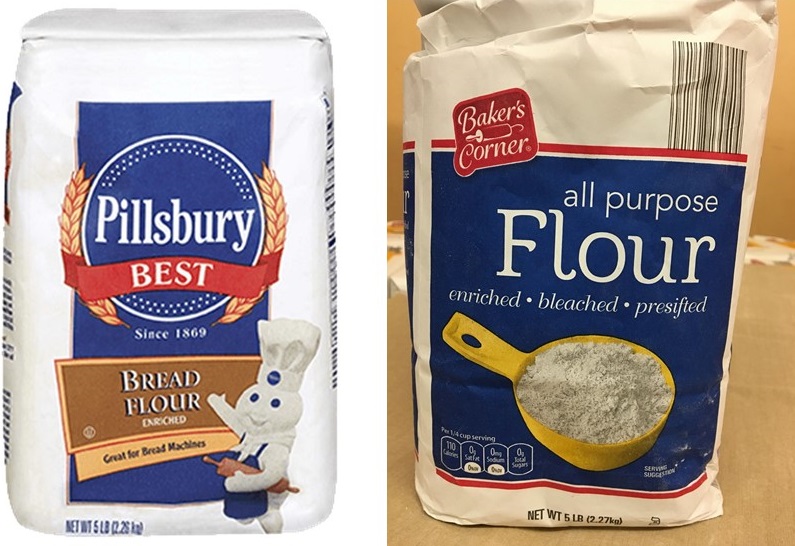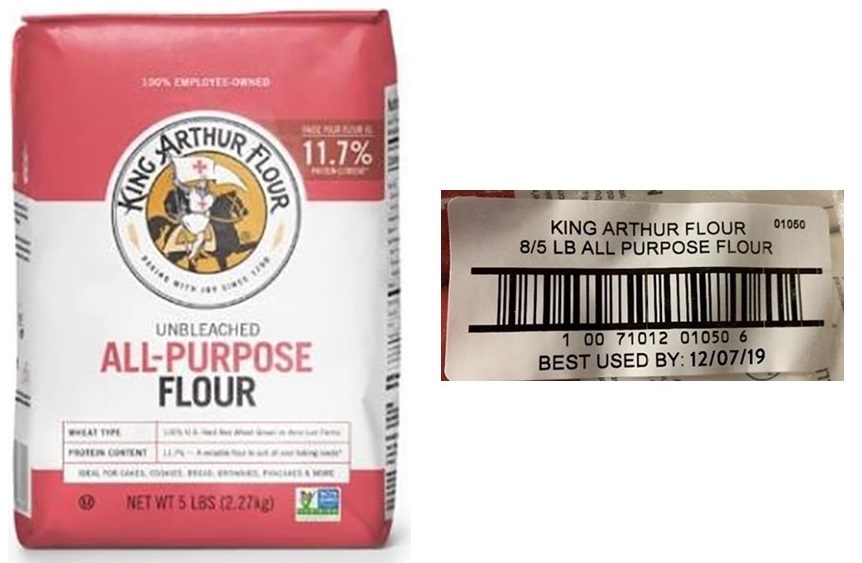Outbreak Investigation of E. coli: Flour (May 2019)
Outbreak linked to ADM Milling Co. flour appears to be over
July 11, 2019
The United States Food and Drug Administration (FDA), the Centers for Disease Control and Prevention (CDC), and state and local partners, investigated a multistate outbreak of E. coli O26 linked to ADM Milling Co. flour.
On July 11, 2019, CDC announced that the outbreak appears to be over.
Recommendation
Consumers should not use or eat recalled flour or bake mixes.
Due to potential contamination, do not eat any raw cake mix, batter, or any other raw dough or batter product that is supposed to be cooked or baked.
Wash hands, work surfaces, and utensils thoroughly after contact with flour and raw batter or dough products.
Keep raw foods separate from other foods while preparing them to prevent any contamination that may be present from spreading. Be aware that flour or cake mix may spread easily due to its powdery nature.
On this Page
Case Counts
Total Illnesses: 21
Hospitalizations: 3
Deaths: 0
Last illness onset: May 21, 2019
States with Cases: CA, CT, MA, MO, NJ, NY, OH, PA, RI
Distribution of Recalled Product
ALDI Product Distribution: CT, DE, MA, NH, NJ, NY, OH, PA, RI, VT, WV
King Arthur Flour Distribution: Nationwide
Pillsbury Best Bread Flour Distribution: CT, DE, MD, ME, NH, NJ, NY, OH, PA, VA
Brand Castle Cookie and Brownie mixes: AL, IA, KS, MN, MO, NE, NY, OH, SC, UT
What Products are Recalled?
At this time recalled products include:
Brand Castle cookie and brownie mixes, sold in 25 oz and 32 oz glass jars
- Brand Castle Arctic Chill Chocolate Mint Cookie Mix
- UPC: 6-54448-01035-2
- Lot: L6112618
- Brand Castle Hot Cocoa Cookie Mix
- UPC: 6-54448-01036-9
- Lot: L5111918
- Sisters Gourmet Million Dollar Cookie Mix
- UPC: 6-54448-00002-5
- Lot: L2121818
- Sisters Gourmet Billion Dollar Brownie Mix
- UPC: 6-54448-00017-9
- Lot: 31OCT2019BC8324
- In the Mix Chocolate Mint Chip Cookie Mix
- UPC: 6-54448-01081-9
- Lot: LM101518
- Brand Castle The Grinch Sugar Cookie Mix with Sprinkles
- UPC: 6-54448-01038-3
- Lot: 25JUL2019BC8324
ALDI Baker’s Corner All Purpose flour
- All five-pound bags, all lot codes, and all best if used by dates for product distributed in Connecticut, Delaware, Massachusetts, New Hampshire, New Jersey, New York, Ohio, Pennsylvania, Rhode Island, Vermont and West Virginia
King Arthur Flour
- Five-pound bags of unbleached all-purpose flour with the following lot codes and best by dates:
- BEST USED BY 12/07/19 LOT: L18A07C
- BEST USED BY 12/08/19 LOTS: L18A08A, L18A08B
- BEST USED BY 12/14/19 LOTS: L18A14A, L18A14B, L18A14C
- This does not include products sold through the King Arthur website, Baker’s Catalogue, or the Baker’s Store in Norwich, VT.
Pillsbury Best Bread Flour
- Five-pound bags of flour distributed in Connecticut, Delaware, Maryland, Maine, New Hampshire, New Jersey, New York, Ohio, Pennsylvania, and Virginia with UPC Code 0 5150020031 5 and the following lot codes and use-by dates:
- Lot Code: 8 342 Use-By Date: JUN 08 2020
- Lot Code: 8 343 Use-By Date: JUN 09 2020
Additional information will be provided as it becomes available.
Learn more:
- Brand Castle Recall Notice
- ALDI Recall Notice
- ADM Milling Co. Recall Notice
- King Arthur Flour Recall Notice
- Hometown Food Recall Notice
- RIDOH Public Warning
What is E. coli?
E. coli are mostly harmless bacteria that live in the intestines of people and animals and contribute to intestinal health. However, eating or drinking food or water contaminated with certain types of E. coli can cause mild to severe gastrointestinal illness. Some types of pathogenic (illness-causing) E. coli, such as Shiga toxin-producing E. coli (STEC), can be life-threatening.
People infected with pathogenic E. coli can start to notice symptoms anywhere from a few days after consuming contaminated food or as much as nine days later. Generally, the symptoms include severe stomach cramps, diarrhea, fever, nausea, and/or vomiting.
The severity or presence of certain symptoms may depend on the type of pathogenic E. coli causing the infection. Some infections can cause severe bloody diarrhea and lead to life-threatening conditions, such as a type of kidney failure called hemolytic uremic syndrome (HUS), or the development of high blood pressure, chronic kidney disease, and neurologic problems. Other infections may have no symptoms or may resolve without medical treatment within five to seven days.
Due to the range in severity of illness, people should consult their health care provider if they suspect that they have developed symptoms that resemble an E. coli infection., including HUS, but even healthy older children and young adults can become seriously ill.
People of any age can become infected with pathogenic E. coli. Children under the age of 5 years, adults older than 65, and people with weakened immune systems are more likely to develop severe illness as a result of an E. coli infection. However, even healthy older children and young adults can become seriously ill.
- FDA – E. coli
- FoodSafety.gov – E. coli
- CDC – E. coli (STEC)
- FDA Consumer Update: Raw Dough's a Raw Deal and Could Make You Sick
What Else Should Restaurants and Retailers Do?
In the event that retailers and/or other food service operators are found to have handled recalled or other potentially contaminated food in their facilities, they should:
- Contact their local health department and communicate to their customers regarding possible exposure to E.coli.
- Wash the inside walls and shelves of the refrigerator, cutting boards and countertops, and utensils that may have contacted contaminated foods; then sanitize them with a solution of one tablespoon of chlorine bleach to one gallon of hot water; dry with a clean cloth or paper towel that has not been previously used.
- Wash and sanitize display cases and surfaces used to potentially store, serve, or prepare potentially contaminated foods.
- Wash hands with warm water and soap following the cleaning and sanitation process.
- Conduct regular frequent cleaning and sanitizing of cutting boards and utensils used in processing to help minimize the likelihood of cross-contamination.
What Else Should Consumers Do?
People should consult their healthcare provider if they suspect that they have developed symptoms that resemble an E.coli infection.
Consumers should follow these steps for preventing foodborne illness:
- Wash the inside walls and shelves of the refrigerator, cutting boards and countertops, and utensils that may have contacted contaminated foods; then sanitize them with a solution of one tablespoon of chlorine bleach to one gallon of hot water; dry with a clean cloth or paper towel that has not been previously used.
- Wash and sanitize surfaces used to serve or store potentially contaminated products.
- Wash hands with warm water and soap following the cleaning and sanitation process.
Consumers can also submit a voluntarily report, a complaint, or adverse event (illness or serious allergic reaction) related to a food product.
Previous Updates
June 21, 2019
On June 21, 2019, Brand Castle, LLC, of Bedford Heights, Ohio, recalled several brands of cookie and brownie mix because flour used in them was potentially contaminated with E. coli. The following Brand Castle mixes, sold in 25-oz and 32-oz glass jars, were recalled:
Brand Castle Arctic Chill Chocolate Mint Cookie Mix
UPC: 6-54448-01035-2
Lot: L6112618
Brand Castle Hot Cocoa Cookie Mix
UPC: 6-54448-01036-9
Lot: L5111918
Sisters Gourmet Million Dollar Cookie Mix
UPC: 6-54448-00002-5
Lot: L2121818
Sisters Gourmet Billion Dollar Brownie Mix
UPC: 6-54448-00017-9
Lot: 31OCT2019BC8324
In the Mix Chocolate Mint Chip Cookie Mix
UPC: 6-54448-01081-9
Lot: LM101518
Brand Castle The Grinch Sugar Cookie Mix with Sprinkles
UPC: 6-54448-01038-3
Lot: 25JUL2019BC8324
The products were distributed in Alabama, Iowa, Kansas, Minnesota, Missouri, Nebraska, New York, Ohio, South Carolina, and Utah. Brand Castle initiated the recall in cooperation with ADM Milling Co.
Photos of these products are available in the Brand Castle LLC press release.
June 14, 2019
On June 14, 2019, Hometown Food Company, an additional customer of ADM Milling Co., issued press, to inform customers of the recall of five-pound bags of Pillsbury Best Bread Flour with UPC Code 0 5150020031 5 and the following lot codes and use-by dates:
Lot Code: 8 342 Use-By Date: JUN 08 2020
Lot Code: 8 343 Use-By Date: JUN 09 2020
This product was distributed in Connecticut, Delaware, Maryland, Maine, New Hampshire, New Jersey, New York, Ohio, Pennsylvania, and Virginia.
June 13, 2019
On June 13, 2019, King Arthur Flour, Inc., a customer of ADM Milling Co., issued press, to inform customers of the recall of five-pound bags of unbleached all-purpose flour with the following lot codes and best by dates:
BEST USED BY 12/07/19 LOT: L18A07C
BEST USED BY 12/08/19 LOTS: L18A08A, L18A08B
BEST USED BY 12/14/19 LOTS: L18A14A, L18A14B, L18A14C
May 24, 2019
The United States Food and Drug Administration (FDA), along with the Centers for Disease Control and Prevention (CDC), and state and local partners, is investigating a multistate outbreak of E. coli O26 linked to ALDI’s Baker’s Corner flour.
The Rhode Island Department of Health (RIDOH) collected and analyzed an unopened sample of this flour and determined that the flour contained E. coli O26. RIDOH issued a public warning to consumers not to eat this flour on May 22, 2019.
ALDI and ADM Milling Co. announced a recall of the flour on May 22, 2019, which was supplied by an ADM Milling Co. production facility in Buffalo, N.Y. On May 23, 2019, ADM Milling Co. announced an expansion of the recall, and ALDI ultimately expanded the recall to all lots and all Best If Used By Dates.
On May 24, 2019, further DNA analysis found that the E. coli in the unopened sample of flour was closely related by whole genome sequencing to the strain of E. coli O26 that has caused an outbreak affecting 17 people in 8 states.
FDA will work with the firms to determine whether other lots of flour made at that production facility may be potentially contaminated and need to be recalled, and on trying to determine the source of the contamination.
Who to Contact
Consumers who have symptoms should contact their health care provider to report their symptoms and receive care.
To report a complaint or adverse event (illness or serious allergic reaction), you can
- Call an FDA Consumer Complaint Coordinator if you wish to speak directly to a person about your problem.
- Complete an electronic Voluntary MedWatch form online.
- Complete a paper Voluntary MedWatch form that can be mailed to FDA.


